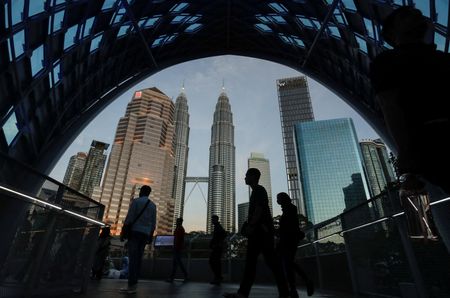By Danial Azhar
KUALA LUMPUR (Reuters) – Malaysia’s economy grew faster than expected in the fourth quarter of 2024 amid strong domestic demand and a recovery in exports, the central bank said on Friday, as it expects investment activities and household spending to drive growth this year.
Bank Negara Malaysia said the 5% year-on-year growth in gross domestic product during October-December was driven by domestic demand, strong investment activity, and sustained household spending.
But it cautioned that the outlook remains subject to risks, including an economic slowdown in major trading partners amid heightening expectations of global trade and investment restrictions, as well as lower-than-expected commodity production.
The fourth-quarter reading was above both an official advance estimate and analysts’ forecast in a Reuters poll of a 4.8% expansion, but softer than the 5.4% expansion in the previous quarter.
On a quarter-on-quarter seasonally-adjusted basis, the economy contracted 1.1%, compared to a revised 1.9% rise in the third quarter.
“Growth was weighed down by contraction in the commodities sector following lower oil palm output as well as the continued decline in oil production.” the central bank said in a statement.
Full-year growth in 2024 was 5.1%, in line with an advance estimate and the government’s forecast range of 4.8% to 5.3%, and compared to 3.6% in 2023.
The government and central bank have forecast the economy will grow between 4.5% and 5.5% in 2025.
Central bank Governor Abdul Rasheed Ghaffour said economic growth this year will be driven by “robust expansion in investment activity, resilient household spending and expansion in exports”.
Annual headline inflation moderated to 1.8% in the fourth quarter of 2024 from 1.9% in the third quarter, while full-year inflation eased to 1.8% from 2.5% in 2023.
Inflation is expected to remain manageable in 2025 amid easing global cost conditions and the absence of excessive domestic demand pressures, the central bank said, though it cautioned that government policies would contribute to upward pressure on prices.
Last year, the government cut costly blanket subsidies for diesel, electricity, and chicken, among others, and plans to extend the policy to a widely used transport fuel in the middle of 2025.
Capital Economics said growth will ease slightly this year due to tighter fiscal policy and a moderation in investment, adding the government’s plan to further cut subsidies would weigh on consumer spending.
“We think GDP growth will ease to 4.8% this year, from 5.1% last year. But with inflation set to rise on the back of subsidy cuts, we think the central bank will keep interest rates unchanged for the foreseeable future.” Shivaan Tandon said in a note.
The central bank held its key interest rate unchanged at 3.00% last month, where it has been since May 2023, citing strong economic growth and steady inflation, while warning of potential currency volatility.
The ringgit is expected to remain influenced by external factors, the central bank said, but Malaysia’s positive economic prospects and policies will provide support in the medium-term.
(Reporting by Danial Azhar; Editing by John Mair and Kim Coghill)











